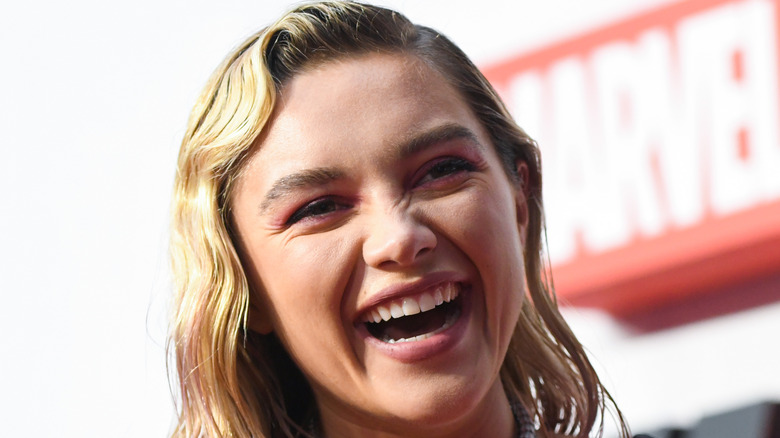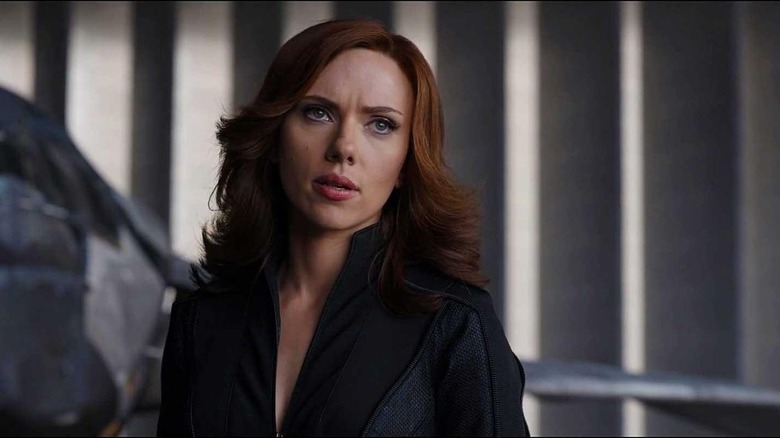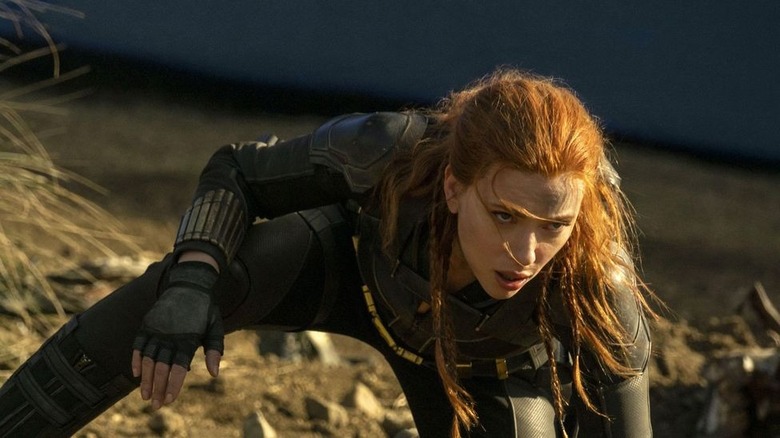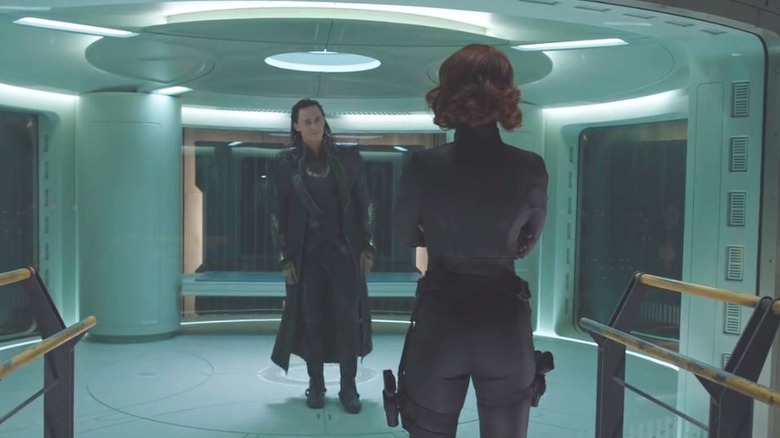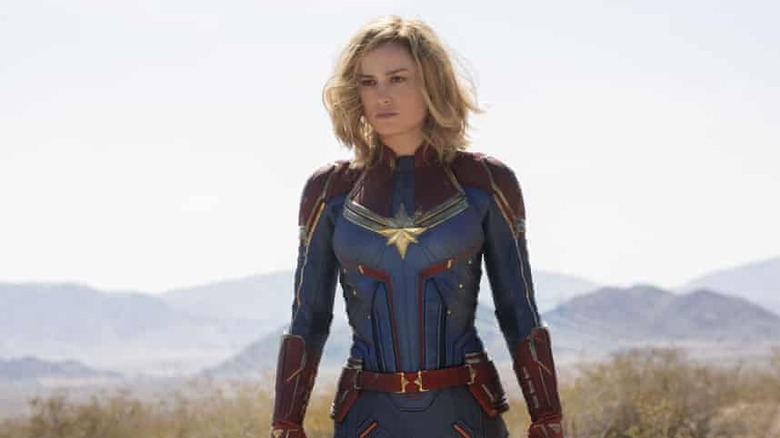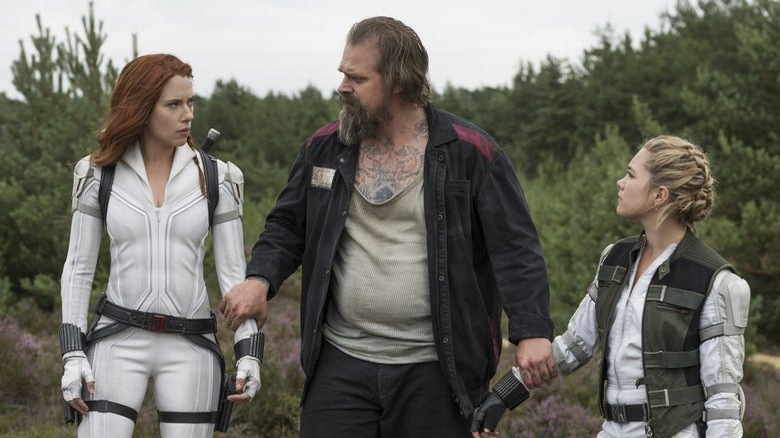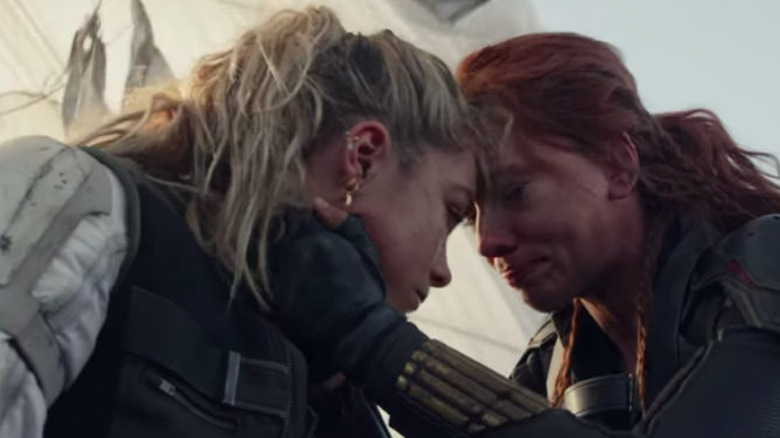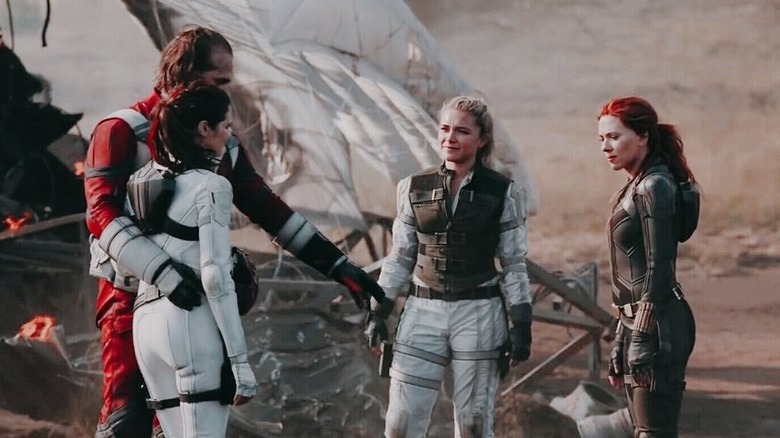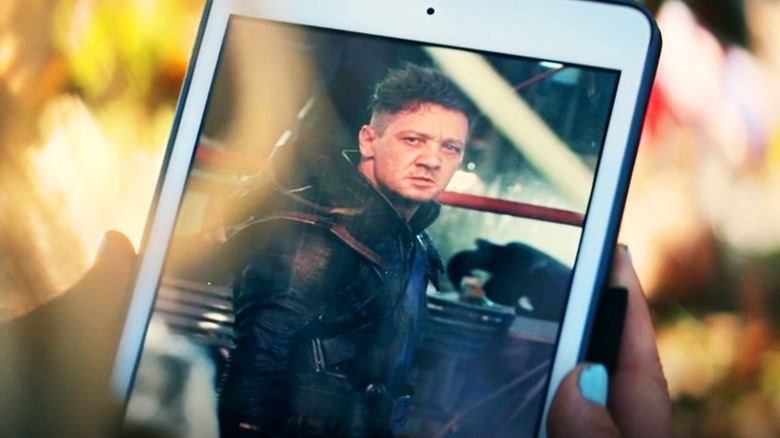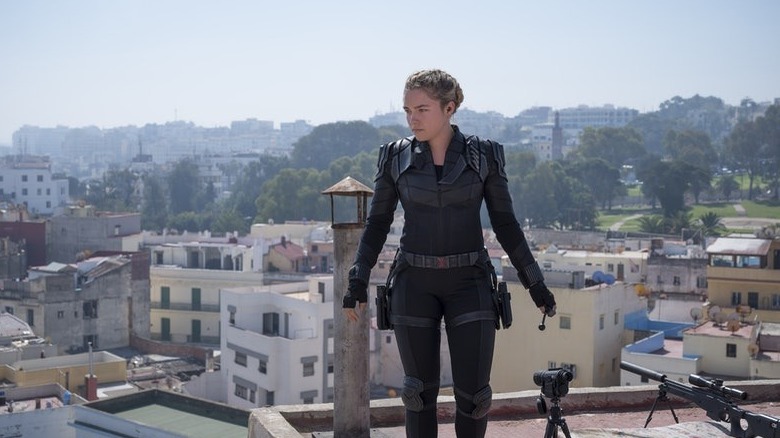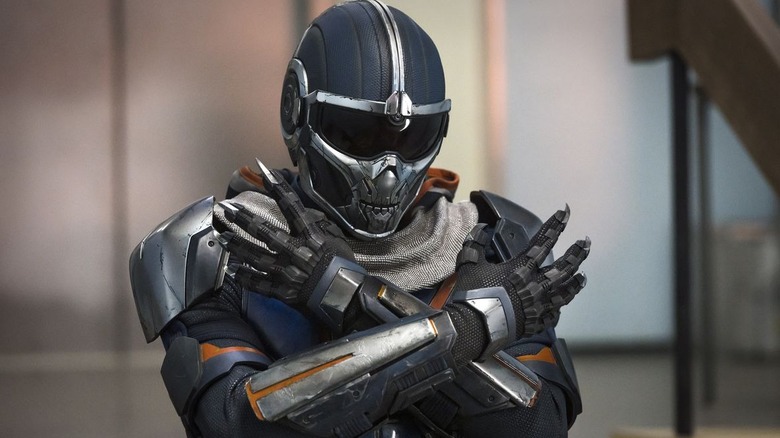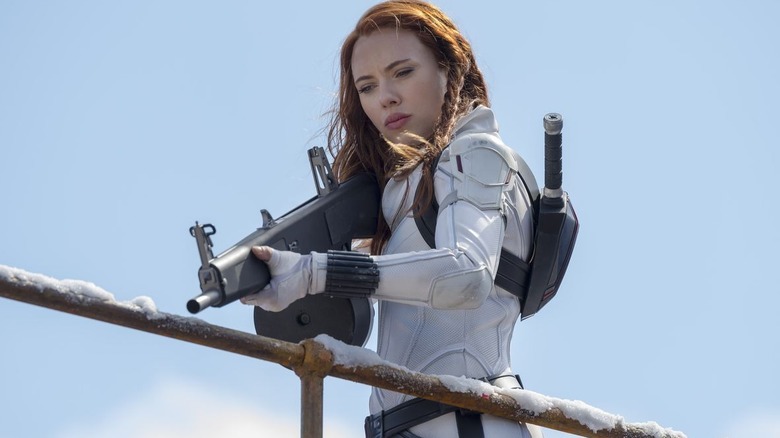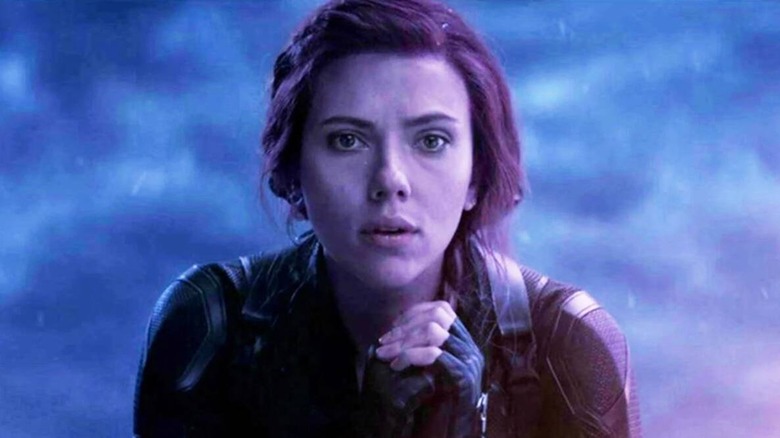What Black Widow Means For The MCU's Future
At last it's here. "Black Widow," the long-awaited solo film for Scarlett Johansson's famous red-haired spy turned superhero, is available to see in theaters and on Disney+ after its release was pushed back three times because of COVID-19.
Natasha Romanoff has been a prominent character since suiting up with Captain America, Iron Man, Thor, Hulk and Hawkeye in 2012's "The Avengers," her second MCU appearance following 2010's "Iron Man 2." Until now, however, she has never quite occupied the spotlight in her own right, remaining a supporting character in other Avengers' solo adventures.
"Black Widow" changes that. For the first time since 2015's "Avengers: Age Of Ultron," Natasha's history is explored in detail, from her dark history in the Red Room to what happened in Budapest with Clint Barton. This MCU prequel, set before "Avengers: Infinity War" (2018) and "Avengers: Endgame" (2019), explores the butt-kicking Avenger's past as well as setting up some significant moments for the future.
Natasha's adopted family, including her sister and successor Yelena Belova (Florence Pugh), seem poised to reappear in future films and/or Disney+ series, as well as possibly other Widows who Natasha freed from the Red Room. Not only that, but "Black Widow" symbolizes a victory for representation, and a new era for Marvel storytelling. Here's how.
Black Widow's place in the MCU's timeline
Set after "Captain America: Civil War," "Widow" begins with General Thaddeus "Thunderbolt" Ross (William Hurt) attempting to arrest Natasha for holding off T'Challa with her widow bites in "Civil War" so Steve and Bucky could escape the airport battle. Natasha evades Ross' soldiers, like the ultimate spy she is, and departs for a lonely exile in a remote region of Norway.
But the world isn't ready for Natasha Romanoff to retire. Thanks to a valuable package from her pseudo-sister Yelena, Natasha is attacked by Taskmaster and pulled back into a fight she thought was over. The red-haired Avenger reunites with Yelena in Budapest, before breaking the Red Guardian (David Harbour) out of prison and tracking down the final member of their former fake family, Melina (Weisz). Then it's an all-out war on the Red Room, as Natasha finally takes down Dreykov (Ray Winstone), the man responsible for the Black Widow program.
"Widow" ends with Natasha dying her hair blonde before the events of "Avengers: Infinity War" and leaving with a Quinjet to spring some friends from prison. This means "Black Widow" is set before the final scene of "Civil War," where viewers saw Steve Rogers show up at the Raft to free Team Cap members Sam Wilson (Anthony Mackie) and Wanda Maximoff (Elizabeth Olsen), filling the gaps between "Civil War" and "Infinity War."
Daughter, Sister, Avenger
"Black Widow" solidifies Natasha Romanoff as a bonafide Avenger. Before the release of her solo movie, Natasha was a side character in other Avengers' films, chiefly "Captain America: The Winter Soldier" and "Iron Man 2", where she made her MCU debut. Natasha plays an important part in every film she's in, but "Black Widow" makes the story about her for the first time, putting her on the same level as main-event Avengers like Cap, Iron Man and Thor.
Not only does "Black Widow" feature Natasha as a protagonist instead of a supporting character, but it provides an in-depth character study that pulls no punches when it comes to Natasha's development. For the first time, it feels like we truly understand what Natasha is thinking and feeling, as she is forced to confront the darkest parts of her past. Black Widow is still a badass, but now she's a badass with motivations, a family, and a story of her own outside of being Steve Rogers' sidekick.
Because of this, "Black Widow" is a well-deserved reward for fans of Natasha Romanoff. Since the release of "The Avengers" in 2012, many have made it clear that they want to see a solo movie for the MCU's first female Avenger. Now, in 2021, "Black Widow" finally gives Natasha's character the justice she deserves.
Callbacks to The Avengers
While this 2021 prequel has a relatively small scope in the MCU, there are still plenty of easter eggs and callbacks to other MCU movies buried in "Black Widow."
In the film's final act, Natasha comes face-to-face with the deplorable Dreykov in a scene that mirrors her exchange with Loki (Tom Hiddleston) in "The Avengers." Dreykov appears to have the upper hand during their confrontation, with Natasha unable to attack him due to a pheromonal fail-safe in her brain.
But this is Black Widow, after all. After Dreykov gives her the information she needs, Natasha thanks him for his cooperation and breaks her own nose to sever the pheromonal block preventing her from attacking. This isn't the only callback to "The Avengers" either. Fans finally learn what happened in Budapest with Clint aka Hawkeye; Natasha helped blow up a building with Dreykov's young daughter inside, in an attempt to kill him and defect to SHIELD. Nat wasn't lying when she said she had red in her ledger.
"Black Widow" also sets up a small easter egg for "Avengers: Infinity War." The vest Natasha wears in "Infinity War" is given to her by Yelena at the end of "Black Widow." This highlights Natasha's connection to her other family, particularly her younger sister — and will perhaps give Johnasson's scenes an added layer of emotional complexity the next time fans watch the 2018 film.
The MCU's second female-led solo film
"Black Widow" joins 2019's "Captain Marvel" (and, to a lesser extent, 2018's "Ant-Man And The Wasp") in the MCU's roster of female-led films. While "Captain Marvel" is an epic space flick with heavy sci-fi elements, "Black Widow" is a more grounded story similar to "Winter Soldier," "Civil War," and the Disney+ series "The Falcon And The Winter Soldier." The heroes are human, the villains are human — but the stakes are every bit as high.
"WandaVision" also brings an MCU superheroine, formerly a side character, into the spotlight. Wanda Maximoff has small but significant roles in "Avengers: Age Of Ultron" and "Avengers: Infinity War," but her character truly comes into her own (and becomes the Scarlet Witch) in her own TV series, alongside Vision (Paul Bettany). This is another example of female characters flourishing as the star of their stories, while paving the way for more female-led solo projects in the MCU.
Black Widow, Captain Marvel and the Scarlet Witch could be considered the first ladies of Marvel's cinematic franchise. They are the first female characters to have their own stories front and center in the Marvel franchise. Black Widow, in particular, set a precedent for women in superhero movies, while creating a legacy worthy of a solo movie.
A new era for Marvel storytelling
"Black Widow" is a milestone for the MCU, largely thanks to its sophisticated storytelling and feminist representation. Before "Captain Marvel," the MCU drew criticism for its consistently male-led movies that featured female characters solely as love interests. The past is the past, but if "Black Widow" is anything to go by then Marvel thoroughly has their focus on the future. This is a progressive new era for the MCU that reflects current societal discussions regarding representation in popular culture.
The mostly female cast of characters in "Black Widow" reinvents women's roles in superhero and action movies while keeping the film's focus on their struggle as people rather than pushing a message onto audiences. Natasha and Yelena are stand-out characters given the same emotional complexity and development traditionally awarded to male characters. Natasha isn't the sexy spy she was in "Iron Man 2;" instead she's a haunted, hurt person faced with a dark past, as strong as she is vulnerable.
This is feminist storytelling done right. The female characters aren't simply the femme fatale, the damsel in distress, the love interest or some other caricature. They are people, flaws and all. In addition to its feminist themes, Dreykov kidnapping thousands of young girls to become Black Widows could be considered a metaphor for human trafficking, further highlighting Marvel incorporating real-life issues into their scripts.
Natasha and Yelena are a great duo
Natasha and Yelena's sisterly dynamic is another highlight for "Black Widow." Natasha has always had great chemistry with her co-stars, whether she's quipping with Tony Stark or helping Steve Rogers find a date. Her dynamic with Yelena is similar, with a level of familiarity between the two that reflects their history and banter that marks them as family.
The sisters' relationship can be compared to Sam and Bucky's in "The Falcon And The Winter Soldier." There's a buddy cop element here; the two duos might give each other a hard time, but they've got their partner's back no matter what. Natasha's relationship with Yelena gives audiences a deeper, more detailed insight into her character. By the time "Widow" ends, viewers know more about the first female Avenger than they ever did before.
Nat and Yelena's relationship in "Black Widow" also shows the torch being passed. Natasha's death in "Endgame" isn't reversed, but fans now know that her legacy lives on. Yelena's reunion with Natasha in "Black Widow" motivates her character going forward, as well as her impact on the MCU.
Will Natasha's family appear again?
Yelena Belova isn't the only member of Natasha's "family" to appear. "Widow" introduces Alexei Shostakov aka the Red Guardian, played by "Stranger Things" actor David Harbour. The Red Guardian is revealed to be another super soldier, successfully created by the Soviet Union and Dreykov's ally — before Dreykov betrayed him and had him incarcerated in prison. The adopted father of Natasha and Yelena, Alexei reunites with his daughters when they bust him out, joining them on their mission to bring down the Red Room.
Fans also meet Natasha's adopted mother, Melina. Another Black Widow, Melina proves to be as formidable as the rest of her family. Both Melina and the Red Guardian survive the film, so there is every chance audiences will see them again in a future MCU instalment.
As for the rest of the Widows who Natasha frees? Now that they're no longer under Dreykov's mind control, the future is full of possibilities for these women. Perhaps a Disney+ series chronicling their stories could be on the horizon?
What the post-credits scene means
The post-credits scene of "Widow" features a familiar face from "The Falcon And The Winter Soldier."
Set after "Avengers: Endgame," the scene has Yelena (accompanied by the dog she's always wanted) visiting Natasha's gravestone, where she grieves for her sister who sacrificed herself to save half the universe. Who should show up but Valentina aka Val the Contessa (Julia Louis-Dreyfus), the mysterious woman who recruited John Walker in "The Falcon And The Winter Soldier."
Yelena reveals this isn't their first meeting; she has worked for Val before. Thinking it is business at first, Yelena rebuffs Val for disturbing her. Then Val drops a doozy — she's here to give Yelena vengeance for her sister, handing her a photo of Hawkeye while proclaiming him responsible for Natasha's death.
Because of this, fans can likely expect to see Yelena appear in the upcoming Disney+ show "Hawkeye" looking to kill Clint Barton. With Hawkeye confirmed to be training Kate Bishop (Hailee Steinfeld), Yelena could also fight Kate, setting up more future MCU stories.
With John Walker (aka US Agent) and Yelena Belova joining Val's mysterious new team, it invites obvious parallels to the recruitment efforts of Agent Coulson and Nick Fury in the early Marvel films. Rumors suggest that this team will be the Thunderbolts, Marvel's equivalent to DC's Suicide Squad.
The seeds were sown in "WandaVision" for a Young Avengers team with the introduction of Billy and Tommy Maximoff, the Scarlet Witch's twins known in the comics as Wiccan and Speed. Billy and Tommy could join Kate Bishop and other upcoming MCU additions, such as Riri Williams (aka Iron Heart) and Kamala Khan (aka Ms. Marvel) to form the Young Avengers. Thunderbolts vs. the Young Avengers? Marvel fans would love to see it.
Yelena Belova's future in the MCU
The Contessa sets Yelena on a war path in the post-credits scene, one that leads straight to Clint Barton in "Hawkeye." An epic showdown between the two sounds — well — epic, but Yelena seems more of an anti-heroine than a straight up villain. Grief will motivate her to take out Clint. However, a friend of Natasha's could show up to help set Yelena straight: Bruce Banner, Clint himself, or even Sam Wilson, experienced counselor?
Whether she's fighting with or against the Avengers, Yelena's future in the MCU following "Widow” looks bright. Her character brings a snarkiness that suits Marvel's signature humor (i.e mocking Natasha's iconic fighting pose), as well as a youthful vulnerability that can be explored as she grows and matures throughout future MCU installments.
Natasha Romanoff sacrifices her life for the Soul Stone in "Avengers: Endgame," but her legacy lives on. "Black Widow" seemingly sets up Yelena to eventually take her sister's place. History could repeat itself: Clint could convince her to join the Avengers in "Hawkeye," like he convinced Natasha to defect to SHIELD. Or maybe another Widow will take her place, now that Dreykov and the Red Room are gone for good.
Will Taskmaster return?
Taskmaster has been met with a fairly mixed response from fans. Some were surprised by the reveal of the move-mimicking antagonist, while others were underwhelmed.
Spoiler alert: Taskmaster is none other than Dreykov's daughter, Antonia, long believed to be dead by Natasha. "Black Widow" deviates from its source material with this reveal in a way that feels similar to "Iron Man 3" using The Mandarin as a red herring; in the comics, Taskmaster is Tony Masters, a mercenary who has fought several key members of the Avengers.
The Taskmaster in "Black Widow" is a different character entirely, but she could take on some of her comic counterpart's characteristics. Thanks to Natasha, Taskmaster survives the destruction of the Red Room and is released from Dreykov's control. Now that she's free to do whatever she wants, Taskmaster could become a mercenary like Tony Masters, using her abilities to help or hinder the Avengers.
Another option could see Taskmaster accompanying Yelena Belova to the Thunderbolts. Taskmaster's ability to mirror the fighting style of other characters — most notably the Avengers — could make her a valuable addition to the team. With all this potential for future MCU arcs, there's every chance fans will see Taskmaster (or another version of the character) again.
More female-led films for Marvel
One of the directions that "Black Widow" points the MCU's future towards is the inclusion of more female-led projects. So far, the Marvel cinematic franchise comprises 24 films, but "Black Widow" is only the second spearheaded by a female character.
That seems likely to change, however; the prequel introduces a roster of female characters, while representing an important milestone for women in the MCU.
President of Marvel Studios Kevin Feige has said that "more than half [of Marvel's heroes] will be women" going forward. With this focus on female representation — as well as Marvel re-acquiring the film rights to the X-Men and the Fantastic Four — fans can expect to see several popular characters from the comics make their MCU debuts in the years ahead.
"She-Hulk" the series is set to stream on Disney+ in 2022. Other iconic characters like Jean Grey, Storm, Rogue and Sue Storm (aka the Invisible Woman) could also be on their way back to the big screen.
Goodbye Natasha Romanoff
More than anything, "Black Widow" is the perfect send-off for Natasha Romanoff. "Endgame" moves past her death on Vormir fairly quickly. The Avengers have to bring everyone back who was dusted in the Blip with the Infinity Gauntlet before Thanos arrives through the Quantum Tunnel. After that, it's all about the epic battle between the Avengers and the Mad Titan's forces, culminating with Iron Man's big sacrifice.
Some have argued that Tony's death eclipses Natasha's in "Endgame." "Black Widow" resolves this.
Viewers see Natasha as they have never seen her before. She's not just a member of the team; she leads the team. An MCU veteran, Natasha deserves to have her story told before her title is passed to a worthy successor. Yelena — or whichever Black Widow follows Natasha's footsteps — has a lot to live up to. But if "Black Widow" is anything to go by, the future looks bright for the MCU.
